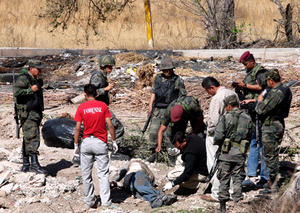South of the borderCiudad Juárez is extremely violent, but U.S. companies are still going there
Mexico’s Ciudad Juárez is one of the most violent places on earth; in the past twenty-eight months, this city of 1.5 million, across the Rio Grande from El Paso, has recorded 5,200 murders; still, low wages and freight costs, tax breaks, and location are all persuading companies to stay in Juárez

The body of U.S. Marshal Vincent Bustamente found in Ciudad Juarez // Source: wordpress.com
Mexico’s Ciudad Juárez is one of the most violent places on earth. Drug gangs fight endless battles with each other and police in the streets and alleys of Juárez’ poorest neighborhoods. In the past twenty-eight months, this city of 1.5 million, across the Rio Grande from El Paso, has recorded 5,200 murders.
Even though Juárez is the center of Mexico’s war on drug dealers, it is holding its own as the center of maquiladoras, the special zones Mexico developed thirty years ago to attract investment. “It’s a dual reality,” explains Bob Cook, president of the El Paso Regional Economic Development Corp., a group that encourages multinationals to invest on both sides of the border.
Christopher Power writes in Bloomberg Businessweek that in return for building factories in the maquiladoras, multinationals get favorable tax treatment, pay low wages (sometimes as low as $4.21 a day), and take advantage of worker training sponsored by the local government. After mass layoffs during the recession, Juárez factories have added 27,000 workers in the past ten months. Blue chips like Johnson & Johnson (JNJ), Delphi Automotive, and Scientific Atlanta show no signs of leaving. El Diario, the local daily, is filled with help-wanted ads from Lear (LEA), Delphi, Siemens (SIE), and other companies. Through April, nine companies had obtained permits to operate in Juárez, about the same as last year. K. Alan Russell, who runs industrial parks in Juárez for dozens of corporate clients, mostly American, says he has landed more business in 2010 than all of last year.
Proximity to the United States is a big reason for Juárez’ staying power as a place to invest, though drug gangs like their proximity to their American customers, too. Companies have direct access to the U.S. market, and freight trucks can go easily from a Juárez factory to U.S. Interstate 10. “From taking the order to delivery, our Juárez plant can get the job done in three to four weeks,” says Derek Johnson, chief executive of a Denver-based maker of store mannequins. “When you throw in ocean shipping, it sometimes takes our China plant 10 weeks to fulfill an order.” Johnson’s experience reflects recent studies that rank Mexican competitiveness right up with China’s, thanks to cheaper freight costs, a relatively skilled workforce, and those low wages.
Power writes that the violence, however, never ceases. Part of Cook’s PowerPoint pitch for investing in Juárez includes color-coded maps showing which cartels operate where in Mexico. The restaurant industry has been hurt by the violence: Many in Juárez do not go out at night. “It will take a miracle to solve this,” says Cook.
Yet Francisco Uranga, Foxconn’s chief business operations officer for Latin America, can only recall one murder of a maquila employee that seemed cartel-related. The gangs, it seems, prey mostly on each other. “They don’t bother us. We don’t bother them,” says Uranga. The maquilas operate in closely guarded areas, often on the city’s outskirts and a stone’s throw from the big bridges to the U.S. This year, bridge traffic is up sharply. “We follow the cycle of the U.S. economy,” says Russell, “not the political instability.”
The bottom line notes Power: Low wages and freight costs, tax breaks, and location are all persuading companies to stay in Juárez.
